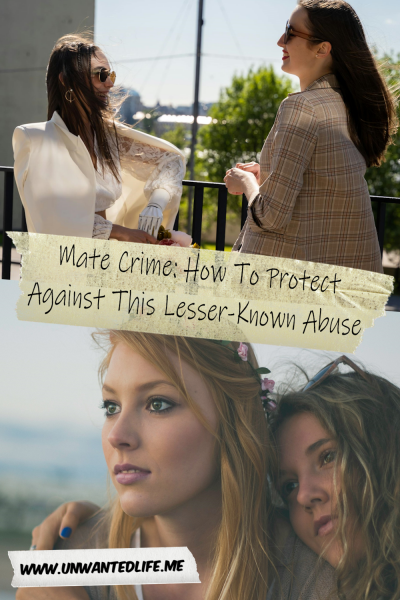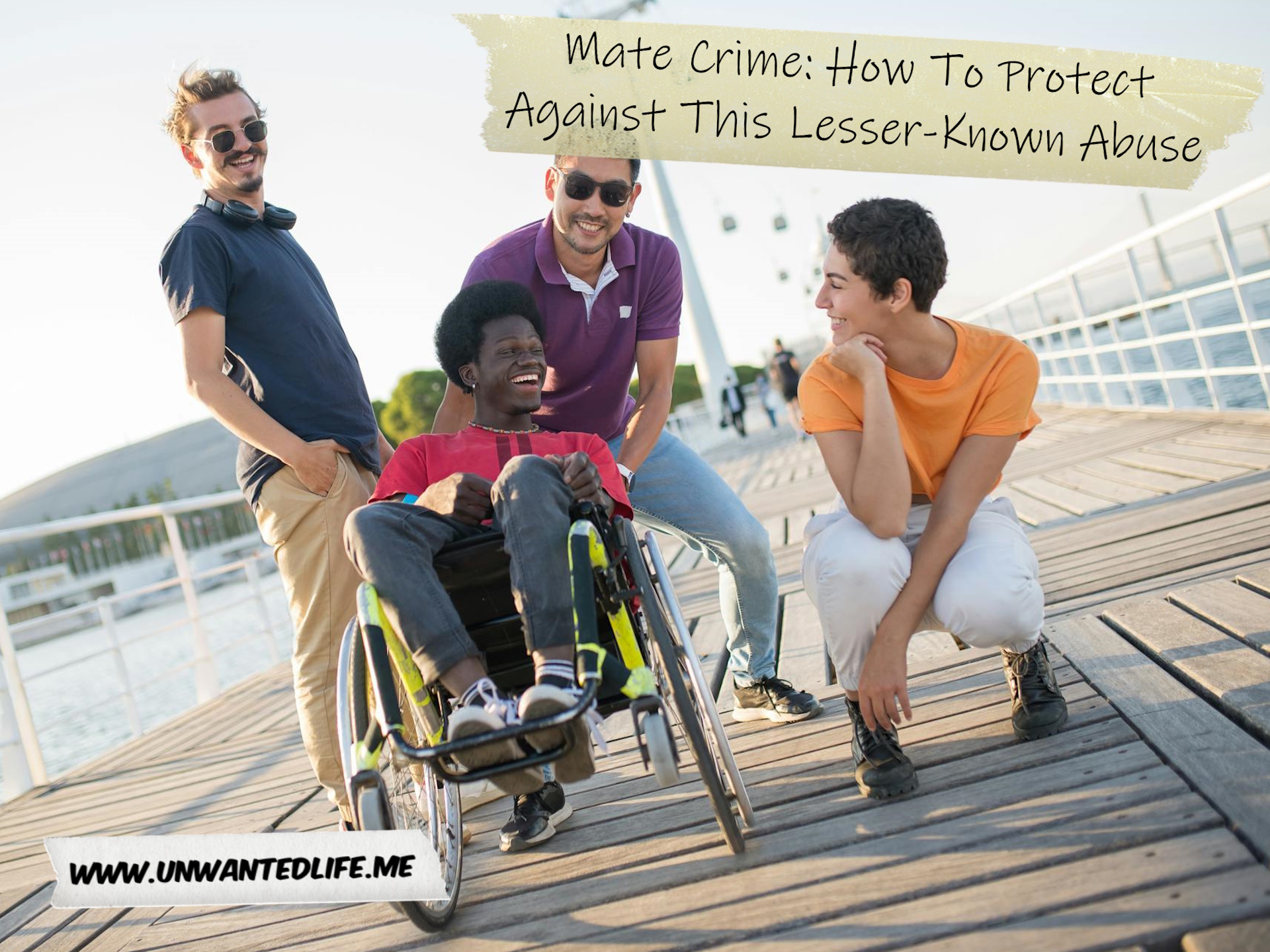While undergoing my mandatory training for work so I could recertify to continue working with clients, I was introduced to mate crime. It’s not a phase I’d heard before, but it certainly piqued my interest as a lesser-known form of abuse. A form of abuse that certainly needs to be talked about. Hence this article.
What Is Mate Crime?
First off, just in case, mate is British and Australian slang for friend. When it comes to mental wellbeing, we’d normally be talking about how important friends and other loved ones are to our social support network. They can give us a sense of belonging and reduce loneliness, but some use this as a way to exploit others (Sivabalan, Mas’ud, and Carlo, 2022). This is mate crime.
Mate crime is considered a form of hate crime, where the offender is known to the person on the receiving end (Forster and Pearson, 2020). According to the Kent Police, these relationships are entered into for the sole purpose of abusing and exploiting those people. They’re the true definition of a fake friend. A real friend also doesn’t need to be bought (Mencap), but these fake friends will.
Mate crime is also considered a form of disability hate crime because people with disabilities and learning disabilities are often at greater risk of this form of abuse (North Yorkshire Safeguarding Children Partnership). This is especially true for those with learning disabilities, as they might not understand what’s happening. For example, according to Forster and Pearson (2020), people who have autism (ASD) may find it hard to interpret social information, particularly with neurotypical people.
The perpetrator gains the person’s trust by acting friendly and supportive. But once trust is established, they start to exploit the person in various ways, taking the form of financial abuse, physical abuse, emotional abuse, and sexual abuse.
What makes things worse is it’s often the people who should care about that person the most who are engaging in this form of abuse and hate crime. The perpetrator of this form of hate crime (mate crime) can be a carer, friend, or family member (Kent Police).
As reported by the Wirral Globe, a study by the Wirral Autistic Society found that 80% of those participants with ASD and Asperger’s syndrome living in Merseyside (an area in the north of England) have experienced mate crime. They also went on to say that a study by the National Autistic Society, which used the same questions, found a nationwide figure of 49%. Frighteningly high figures.
Also, according to Sivabalan, Mas’ud, and Carlo (2022), people living with disabilities, when compared to their nondisabled counterparts, are 1.5 times more at risk of being bullied.
How Can Mate Crime Be Prevented?
First and foremost, when it comes to prevention, awareness plays a big role. People won’t know what to look out for if they don’t even know that this form of abuse and crime exists. According to Doherty (2017), this will then help people understand how disabled people, children, the elderly, refugees, and other people who are in other risk groups can be oppressed in society. Thus, raising awareness of this through your social support network will go a long way.
The following are some of the signs the Kent Police, Wirral Safeguarding Children Partnership, Salford Safeguarding Adults Board, and Autism Together said to watch out for when it comes to mate crime:
- There may be a change in the person’s behaviour or appearance.
- They may have had money or possessions taken from them.
- They might have become more isolated and gained a new friend.
- They may have unexplained absences from school.
- They may feel uneasy about their new friendship.
- They might have started to experience depression or anxiety.
- They may self-harm or engage in self-injury.
- They might have engaged in substance misuse.
- They could be having trouble with paying their bills, when before this wasn’t an issue.
- Their possessions might be disappearing.
- There could be changes to their routines.
- There might be more noise or rubbish than usual.
- They might have lots of people coming to visit and staying over, especially on paydays.
- They may start to cut themselves off from their established social support network.
- If they are ASD, they might have changed as new people came into their orbit.
- They might have unexplained injuries.
- If they have ASD, they might make comments about how their friends would be disappointed if an activity doesn’t take place.
- They may express worry that they’ll lose their friends.
- They might have started to buy gifts for people.
- They might not have food or drink at home when you visit.
It’s also a good idea to have an idea of what makes a good friend and what doesn’t, similar to the red and green flags of a potential romantic partner. Such traits a good friend would have would be respect, honesty, loyalty, empathy, trustworthiness, and not being judgemental.
Another prevention strategy is to make sure you, and those you care about, especially if they may be at a greater risk than others, is to have clear boundaries. For more information on boundaries, check out my article on that topic by clicking here.

My Experience With Mate Crime
Because of my childhood and how the racism I endured affected me, I ended up being a people-pleaser. Now reflecting on that, as I learned about mate crime, I can see I experienced varying degrees of mate crime over the years because of my desperation to be accepted by the society that hated me for existing. I can see this going right back to my primary school years, with my bullies engaging in such behaviours as they pretended to offer that acceptance.
Summary
Remember, mate crime is a form of abuse and a hate crime, and people who experience it often feel ashamed or embarrassed to come forward. It’s important to be supportive and encouraging if you suspect someone is being targeted. By raising awareness, we can help protect not just vulnerable people, but people in general, from this form of exploitation.
As always, leave your feedback in the comments section below. Also, please share your experiences with this form of abuse, mate crime, in the comments section below as well. Don’t forget, if you want to stay up-to-date with my blog, you can sign up for my newsletter below. Alternatively, click the red bell icon in the bottom right corner to get push notifications for new articles.
Lastly, if you’d like to support my blog, then there are PayPal and Ko-fi donation payment options below. Until next time, Unwanted Life readers.
References
Doherty, G. (2017). What is the nature and extent of mate crime offending against disabled people and how effective are institutional responses? (Doctoral dissertation, University of Leeds). Retrieved from https://etheses.whiterose.ac.uk/19519/1/Doherty_G_Sociology_PhD_2017%20.pdf.
Forster, S., & Pearson, A. (2020). “Bullies tend to be obvious”: autistic adults perceptions of friendship and the concept of ‘mate crime’. Disability & Society, 35(7), 1103-1123. Retrieved from https://sure.sunderland.ac.uk/id/eprint/11253/1/Mate%20Crime%20Author%20Accepted.pdf.
Sivabalan, T., Mas’ud, F., & Carlo, D. P. (2022). Mate Crime Victimisation Against People with Disabilities: An Exploratory Study in Sarawak, Malaysia. Pertanika Journal of Social Sciences & Humanities, 30(2). Retrieved from http://www.pertanika2.upm.edu.my/resources/files/Pertanika%20PAPERS/JSSH%20Vol.%2030%20(2)%20Jun.%202022/05%20JSSH-8282-2021.pdf.


Learning about this was interesting.
Knowledge is power
This is so sad to read but so important.
Indeed
Thank you for sharing. It’s so sad to read that people can be so manipulative, yet so important that we learn about it and know what to look out for. Thank you for putting a spotlight on this.
Sally
I’d not heard of this before, it’s scary to read about but good to now know what to look out for
It’s unfortunate that some people can act this way, but that’s why it’s important to raise awareness about it. Thanks for commenting
I’d never heard of mate crime, but the scam examples are sadly familiar. Thanks for raising awareness of this awful practice.
I’m glad I was able to make you aware of it. Thanks for commenting
That’s an important topic. Understanding the different forms of abuse is a key step towards prevention
Exactly
Thank you for this post, which raises our awareness of the Mate crime problem. I read your post with a lot of attention because we can have people around us in a position of vulnerability and it’s important to be able to detect the signs of this type of crime. “Tricky friend” is also a term I came across that refers to this situation of abuse by people close to victims who pretend to be friends. We need to be vigilant against these people who will do anything to take advantage of others.
It’s interesting that it’s also known by a different name, and you sharing that will also help with making others more aware of it. Thanks for commenting
Wow. Thank you for sharing this. I admit I had never heard this term until this article and it makes alot of sense. It’s sad to think people would take advantage of others in this way ;(. I’m sorry that you endured something like that as well. No one deserves that. Thank you for bringing awareness to this issue.
Thank you for commenting